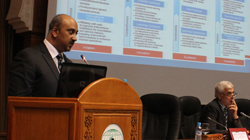

The Institute of Public Administration (BIPA) led by Director General Dr. Raed Mohammed bin Shams participated in the 4th World Congress of the United Cities and Local Governments (UCLG), which was inaugurated last Wednesday in Rabat, the Kingdom of Morocco, under the auspices of His Majesty King Mohammed the 6th, with the participation of more than 3,000 people from different countries of the world.
In a panel discussion entitled “human capitals serving local development”, Dr. Raed bin Shams shed light on BIPA's experience in building Bahraini capacities through designing training programs that contributed in creating a large number of government leaders, as well as generating a second row of leaders capable of supporting sustainable development process, also the achievements accomplished in this area during the past years were presented and reviewed.
Bin Shams said that the Congress is an opportunity for exchanging views, experiences and expertise, indicating that all countries of the world are facing challenges, and suffering from intensity-varying problems, such as unemployment, education, security and others, adding that the debate and the exchange of expertise and experiences is one of the keys to addressing these challenges.
Bin Shams mentioned that BIPA has received a special invitation to participate in the Congress, due to the prominent role achieved by the Institute in the field of human capacity-building, as well as the quantity of administrative achievements attained at international level, where the Kingdom of Bahrain has become one of the outstanding models in the Arab region, and an ideal example in governmental development. The Director General confirmed in the same context, the importance of participation in such international gatherings, which form an opportunity for coming together, convergence and cross-pollination of Arabic and international ideas, and come up with new concepts that enable organizations to face current and future challenges.
It is worth mentioning that the Congress discussed five main themes as follows: improving the quality of life, diversity management, keeping up with the new governance and changes in the Mediterranean, in addition to strengthening solidarity among local units, and controlling of future construction, also the Congress program contained seminars and workshops and about 40 round tables that discussed a set of problems facing local governments.
